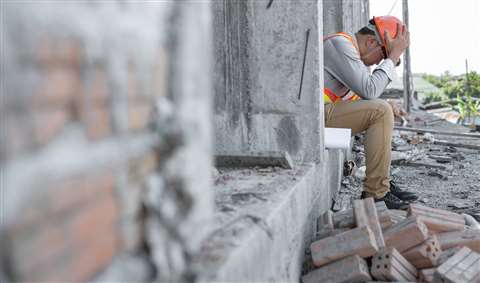Construction workplace stress: How to manage it
31 March 2023
 Image: phoderstock via AdobeStock - stock.adobe.com
Image: phoderstock via AdobeStock - stock.adobe.com
Work in the construction sector can be stressful.
In fact, nearly half of construction workers responding to a 2022 US survey said they feel stressed in their current job.
This weekend saw the start of Stress Awareness Month and to mark its arrival, International Construction takes a look at some of the main causes of stress in the construction workplace, things you can do to alleviate stress, and where you can find more help if it is getting on top of you or a colleague.
What is stress?
The World Health Organisation (WHO) defines stress as a state of worry or mental tension caused by a difficult situation.
Stress a natural response to challenges and is something that everyone experiences to some degree – in certain situations it can even by useful by providing a surge of adrenaline to help us navigate dangerous or unexpected situation.
But the WHO highlights that the way people respond to stress can make a difference to overall wellbeing.
And prolonged stress can lead to adverse health effects. They include mental health problems such as breakdowns, depression, and ultimately even suicide. It can also provoke physical symptoms such as immune system problems, digestive issues, or even heart disease, stroke or cancer.
Causes of stress in construction
The reasons for workplace stress in construction are varied and complex. They can relate not just to the job itself and the demands placed on individuals, but also the culture of the business or client they are working for and wider environment they find themselves working in.
Among stresses related to the job itself are: heavy workloads; ambitious deadlines; timeline pressures caused by delays; lack of skills for the role; working in isolation or away from home; concern over a lack of work.
Within their role, construction workers may also becomes stressed by: lack of support or poor communication from management; inadequate remuneration; lack of clarity of responsibilities; job insecurity.
Other external factors that can cause stress include: concerns over site safety or inadequate equipment; poor site conditions (noise, temperature, ventilation, lighting etc); lack of privacy.
What employees can do to deal with stress
- Communicate: It may help to share with family or friends that you are feeling under pressure. But it can also be important to communicate to your managers and colleagues that you are struggling with stress. They may be able to offer was to help or offer a fresh perspective.
- Prioritise your workload: Organising your time and creating achievable goals can help you feel a sense of accomplishment and reduce stress. Break down larger tasks into smaller, manageable steps.
- Take breaks: It’s essential to take breaks throughout the day to recharge and avoid burnout. A short break can help you refocus and return to work with renewed energy.
- Focus on sleep: Getting enough good-quality sleep is crucial for managing stress. Establish a consistent sleep routine. Avoiding alcohol and other stimulants or depressants like nicotine, caffeine and excess sugar can also help to improve your sleep, as well as your general mental wellbeing.
- Stay hydrated: Dehydration can cause fatigue and stress. It is especially important to drink plenty of water if you are working in hot or arid climate, particularly when on site.
- Exercise regularly: Exercise is an effective stress reliever. Try to incorporate some physical activity into your daily routine, such as stretching, walking, or jogging.
- Practice relaxation techniques: Take a few minutes each day to practice relaxation techniques, such as deep breathing, meditation, or yoga.
- Seek support: If stress is affecting your ability to function or impacting your mental health, consider seeking support from a mental health professional (see resources below) or an employee assistance program.
What employers can do to help
- Be supportive: Check in with employees about their workload and the deadlines they are working to.
- Understand the warning signs: If workers appear irritable, tired, indecisive or withdrawn, these are among some of the signs that they could be stressed. Understanding how to recognise these signs and acting on them is key.
- Communicate and plan collaboratively: Communicate with workers to help them to understand which tasks to prioritise. Plan collaboratively with them to set achievable goals.
- Training: Offer training and personal development in areas where employees feel they need it
- Flexibility: Offer flexible working patterns and breaks
- Know your team’s limits: Do not take on more work if employees are already at capacity
- Signpost help and resources: Let employees know where can find support if they are struggling with stress, either within your own organisation or externally.
Where to find more support
Australia
Mates in Construction: Charity that informs the construction industry about best mental health practice and connects workers to help and support.
Canada
Heads Up Guys: Offers an international therapist directory to connect men with local mental health professionals.
France
Association de prévention santé du bâtiment et des travaux publics (APST-BTP): Provides services to promote health and wellbeing in construction, including stress management.
Germany
DAK Gesundheit: Germany health insurance company offering a range of resources to help manage stress and promote mental wellbeing
UK and Ireland
Lighthouse Club: A charity providing financial and emotional support to construction workers. It runs the Construction Industry Helpline, which provides 24/7 confidential support and advice.
Mates in Mind: A charity raising awareness and addressing the stigma of poor mental health.
USA
Mental Health America: Promotes mental health as a critical part of overall wellness, including prevention services for all.
Man Therapy: Signposts to mental health resources by state across the US
STAY CONNECTED


Receive the information you need when you need it through our world-leading magazines, newsletters and daily briefings.
CONNECT WITH THE TEAM











